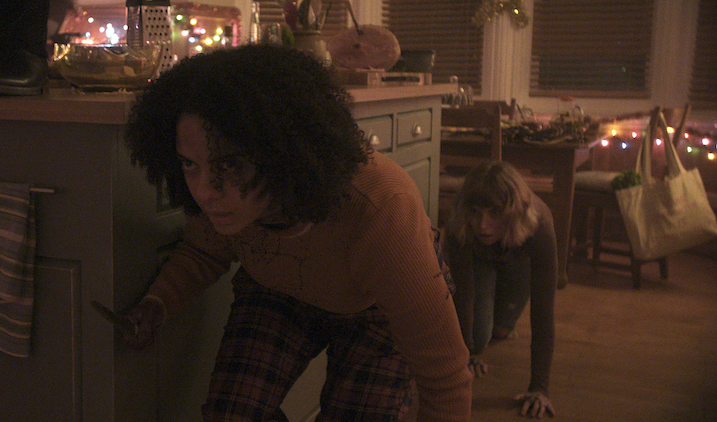Black Christmas is DOA (Movie Review)
 Those looking for wit, thrilling kills, and bite will be let down by Black Christmas. Pitched as a #MeToo-era slasher flick under the Blumhouse brand, the reality is a movie merely paying lip service to a worthy cause. Imogen Poots (Green Room) manages to come out of this unscathed, but the rest of the cast can’t escape too many flat line readings. Also, the dreaded PG-13 vibe is rampant, as this film was clearly aiming for an R rating before it was gutted. Still, I’m not sure a director’s cut can save an undeveloped premise featuring sorority sisters being terrorized by brain-washed, white frat bros. The first lump of coal of the holidays, Black Christmas isn’t naughty or nice… just bland.
Those looking for wit, thrilling kills, and bite will be let down by Black Christmas. Pitched as a #MeToo-era slasher flick under the Blumhouse brand, the reality is a movie merely paying lip service to a worthy cause. Imogen Poots (Green Room) manages to come out of this unscathed, but the rest of the cast can’t escape too many flat line readings. Also, the dreaded PG-13 vibe is rampant, as this film was clearly aiming for an R rating before it was gutted. Still, I’m not sure a director’s cut can save an undeveloped premise featuring sorority sisters being terrorized by brain-washed, white frat bros. The first lump of coal of the holidays, Black Christmas isn’t naughty or nice… just bland.
–

After a quick opening shows a sorority sister offed by a black-cloaked baddie, we meet our main group of final gals led by Riley (Poots). Well, “led by” is a stretch, as Riley suffered greatly after being roofied and raped by a frat guy the previous year. She is understandably traumatized, and her friends try to support her. Except, not really. Her main pal Kris (Aleyse Shannon) is an awful caricature of an SJW mixed with that “too chatty” character-type who usually dies in the first half of a horror film.
Riley just wants to relax over the break, but Kris straight-up bullies her into putting on a scantily clad Santa outfit a la Mean Girls to perform in front of her classmates, which includes the man who sexually assaulted her. This moment does bring Riley out of her shell, though, because “movie.” She delivers accusatory lyrics riling up the alt-right jerks. This is one of Black Christmas‘ few bright spots. We want to see her stand up for herself, to take back her power.
The rest of the pic settles into a kind of slasher meets home invasion mash-up. This would be fine if the suspense wasn’t undercut by jump scares. Worse, every kill is merely a cutaway as per the PG-13 mandate. It’s pretty lame.

Here’s the thing: slasher films are like 99% white males (Candyman FTW!) killing sexually rambunctious dumb teens. Part of the reason those films worked, even when they were terribly made, is that the killer was a kind of an outcast – like how Jason began as a mentally challenged boy, and it’s those promiscuous teens that led to him drowning. There’s a push and pull.
In real life, no one should be hacked to pieces. Still, post-Vietnam that level of violence was both all too real, and those films from the 70s and 80s offered an abstract killer to deliver cathartic thrills. That’s why viewers from this era will believe Michael Meyers is impossible to kill. Behind that mask is pure evil, sure, but the real evil is the lack of humanity of the era.
The killers in Black Christmas are, on one side, evil white males, and on the other, possibly brain-washed by some mystical force. And hey, silly stuff like that can work, but it feels more like a cheap plot device than a way to really delve into the mind of these young men who hate women. Cary Elwes shows up as a prominent teacher who’s embroiled in scandal. And yet, his part has zero to it. He’s a jerk, possibly a homicidal one, and that’s that.

The original Black Christmas (1974) actually predates John Carpenter’s Halloween (1978). The films are similar to a point, but the Bob Clark feature constantly utilized the point of view of the killer. As such, it creates a creepy ambiguity over who’s responsible (meanwhile, the 2004 remake was disposable). This 2019 effort lacks any kind of visual ingenuity beyond the standard bad guy compositions. I did like the high grain speed, though, which evokes 80s horror. So that’s something.
Director Sophia Takal and writer April Wolfe aimed to put a feminist slant on the slasher genre the way Coralie Fargeat’s Revenge did with amazing results for the rape/revenge sub-genre. This decade has seen a lot of great subversion to the horror genre by women, such as Jennifer Kent’s The Babadook or Julia Ducournau’s Raw. Black Christmas, disappointingly, isn’t in the same league. A lot more could have been mined here. Frankly, it’s almost an achievement to take such a great idea and do nothing with it, but the film is still a bore.























